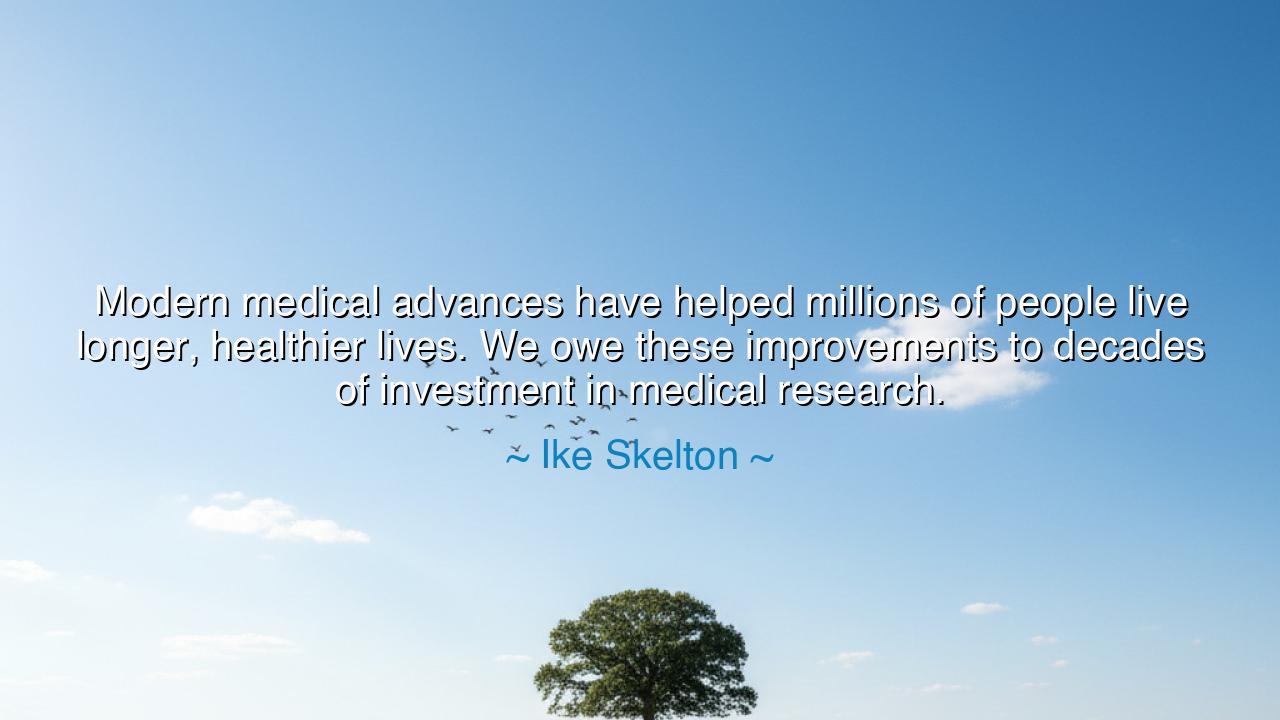
Modern medical advances have helped millions of people live
Modern medical advances have helped millions of people live longer, healthier lives. We owe these improvements to decades of investment in medical research.






"Modern medical advances have helped millions of people live longer, healthier lives. We owe these improvements to decades of investment in medical research," says Ike Skelton, a statement that reflects the profound impact of human ingenuity and dedication on the quality of life. In this truth lies the ancient lesson that progress is born not from mere chance, but from sustained effort and purposeful investment. The wisdom of the past has always emphasized that the pursuit of knowledge and understanding is the foundation upon which great civilizations are built. And in the realm of medicine, that pursuit has been nothing short of transformative.
In ancient times, the Egyptians were among the first to blend spirituality with healing, seeing health as a gift from the gods and a responsibility of the living. They practiced an early form of medicine, understanding that the body and mind were interconnected. But their knowledge was limited, and diseases that we now have cures for were often beyond their reach. Yet, they laid the foundation for the pursuit of health—a pursuit that, like the ancient philosophers who sought wisdom, would be passed down through generations. It was this investment in knowledge that would later lead to the great medical breakthroughs we witness today.
Consider the story of Hippocrates, the ancient Greek physician often called the “Father of Medicine.” In his time, medicine was rudimentary, but his observations and principles of care laid the groundwork for centuries of medical research. He championed the idea that diseases were not punishments from the gods but were natural phenomena that could be studied and treated. His legacy is not in any one cure but in the foundational belief that knowledge must be gathered and shared to improve the lives of humanity. The investment in research that he championed has echoed down through the ages, culminating in the incredible medical advancements of today.
By the time we reach the Renaissance, a new era of scientific discovery took hold. Leonardo da Vinci, with his studies of the human body, and Andreas Vesalius, with his pioneering work in anatomy, exemplify how the investment in medical research led to revolutionary advances. The Renaissance was a time of great intellectual awakening, and the thirst for knowledge spurred innovations that, though rudimentary by today’s standards, set the stage for modern medical practices. Just as the great builders of the past laid the stones for the roads we walk today, these early scholars paved the way for the medical research that would transform lives centuries later.
As Ike Skelton so rightly points out, it is the decades of investment in medical research that have made the modern advancements we take for granted possible. The story of the smallpox vaccine is a shining example of how long-term dedication to medical research can change the course of history. In the 20th century, Edward Jenner's discovery of the vaccine saved millions of lives and eventually led to the eradication of smallpox, one of the deadliest diseases known to humankind. This victory was not achieved in a short time, but through the relentless pursuit of knowledge, the accumulation of data, and the courage to invest in finding a cure.
The same spirit of dedication can be seen in the fight against polio. For decades, scientists poured their energy into studying the virus, and in the 1950s, Jonas Salk developed the polio vaccine, a monumental achievement in the history of medicine. The journey from the early days of polio outbreaks to the near eradication of the disease today is a story of investment—in research, in people, and in the idea that the pursuit of knowledge and understanding can lead to great change.
The lesson here is clear: progress in medicine, as in any field, requires a sustained commitment to research and learning. It is not enough to simply hope for solutions to emerge; we must invest in the pursuit of knowledge, dedicate resources to understanding the challenges we face, and never lose sight of the potential that lies in discovery. Just as the great healers of the past built on the knowledge of their predecessors, so too must we continue to invest in the medical research that will one day solve the challenges of our time.
So, let us take this lesson to heart: health is not a given, but a gift earned through centuries of human effort. Let us honor the work of those who came before us by continuing to invest in the research that will improve the lives of generations to come. It is through this sustained commitment to knowledge and discovery that we ensure a future where more lives are saved, more suffering is alleviated, and the gifts of health continue to flow from the wellspring of human ingenuity.






AAdministratorAdministrator
Welcome, honored guests. Please leave a comment, we will respond soon